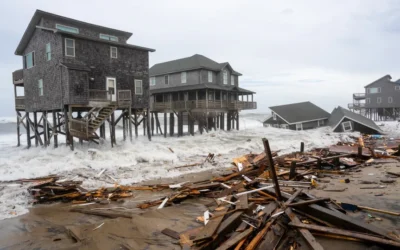North Carolina

Atlantic Fury: North Carolina Homes Collapse into the Ocean
Recent storms battered the North Carolina coast, and the damage was dramatic. On September 30, powerful waves generated by Hurricanes Humberto and Imelda caused at least six beachfront homes in Buxton—on the Outer Banks—to crumble and fall into the sea. Fortunately, no one was hurt because the houses were unoccupied at the time. These collapses highlight how vulnerable the barrier islands are to erosion, shifting sands, and storm surge. This is not the first time it has happened. Since 2020, nearly 20 privately owned homes in the same region have already been lost to surf and erosion. (MORE NEWS: General Motors CEO Pulls Back on EV Ambitions) Storms Offshore, Damage Onshore Although both Humberto and Imelda stayed offshore, their effects reached the coast. Hurricane Imelda, despite not making landfall, pushed strong winds, rain, and heavy surf toward the U.S. East Coast. Meanwhile, Humberto added to the turmoil by sending more swells toward the shoreline of North Carolina. Because the storms remained out at sea, many inland areas escaped serious flooding and wind damage. However, the surf zones bore the full force of pounding waves. The National Park Service warned that hazardous debris and shifting sands would linger along the beaches and require caution for days. The Collapse: How It Happened In Buxton, five houses on stilts collapsed within a 45-minute span on Tuesday afternoon. Later that night, a sixth home fell. Dramatic footage showed one structure swaying precariously before disintegrating and plunging into the surf. Wood, debris, and pieces of siding littered the beach in the aftermath. Drone video captured homes that collapsed into the ocean on North Carolina’s Outer Banks on Tuesday amid rough surf from dual hurricanes off the Southeast coast. Five homes fell within a 45-minute period on Tuesday afternoon, and a sixth fell overnight. https://t.co/f8zQoRYVLd pic.twitter.com/U66IOjihPN — AccuWeather (@accuweather) October 1, 2025 These were not ordinary homes. Most were built on pilings or stilts to protect against tides, but the combined assault of waves and undermined foundations proved too much. The erosive power undercut the supports until the structures lost balance and tipped into the water. Officials closed off the area around the collapses. They also shut down parts of Highway 12 and halted ferry service between Ocracoke and Hatteras, citing danger from debris and unstable roadways. Official Response: National Park Service and Local Agencies The National Park Service (NPS) has confirmed the collapse of the homes and urged caution. A spokesperson for the Cape Hatteras National Seashore said staff were actively working to remove debris and monitor risk areas. They also told the public to avoid walking on the beach near the collapse zone. In a previous collapse in Buxton, NPS officials said they would clean the area south of the site, and the homeowner had hired a contractor to remove remaining structure and debris. That incident was the 12th home to collapse along the seashore in five years. Dare County’s Planning Director, Noah Gillman, has also weighed in. He noted that more than 30 structures in the area had been decertified for occupancy due to erosion damage, including harm to stairs and septic systems. He pointed out that many of the collapsed properties had already lost the required separation from the shoreline. Local governments are now discussing options such as potential relocations, stricter setbacks, or buyouts. Officials from the North Carolina transportation department closed parts of Highway 12 and halted ferry crossings in the area until safety could be assured. The closures aimed to protect residents and travelers from danger posed by debris, shifting sands, and instability. A Coast Under Pressure These events are part of an ongoing struggle along the Outer Banks, North Carolina. Beach erosion has steadily eaten away at the shoreline, leaving some homes standing precariously close to the surf. Even when storms remain offshore, their wave energy can be destructive enough to trigger collapses like those seen in Buxton. The geography of the barrier islands makes them particularly vulnerable. Shifting sands, narrow beaches, and exposure to open Atlantic swells mean that conditions can change quickly. For residents and property owners, this creates constant uncertainty. The Human and Policy Dimension While no one was injured in these North Carolina collapses, the impact on property owners and the community is significant. For many, these homes represented investments, memories, and part of the local economy. Their loss raises difficult questions about the future of oceanfront development. Local officials face the challenge of balancing safety, tourism, and property rights. Stronger building codes and better enforcement of setback requirements may help, but erosion continues to place many structures at risk. In some cases, officials may have to consider buyouts or relocation programs for the most threatened properties. The costs of cleanup also fall on local agencies and the National Park Service. Debris removal, beach safety patrols, and roadway repairs require time, labor, and funding. Looking Ahead: Lessons and Warnings North Carolina is no stranger to hurricanes and flooding. But the collapse of homes in Buxton is still a stark reminder that the ocean’s power should never be underestimated. Even when hurricanes remain offshore, the waves and surf they generate can cause serious destruction. When homes are built too close to the waterline in areas that see high water during hurricanes, disaster is not a surprise — it is expected. The ocean shifts beaches, pushes storm surge inland, and leaves little margin of safety for houses standing only feet from the tide. And this isn’t about climate change. You can’t blame the consequences of risky building decisions on the climate. When people choose to build in the path of storm surge and pounding waves, the risk is built in from the start. The shoreline is always moving. Homes positioned too near the surf will remain in jeopardy, and events like this will continue to shape the future of the Outer Banks. By planning ahead and preparing, local communities may reduce losses — but the ocean’s power will always be a formidable force. Unmask the Narrative….

‘If I Was Waiting For FEMA, I Would Be Screwed’: You’ll Sob Watching What’s Happening In NC Months After Hurricane Helene
This article also appears on Million Voices. If Christians organizations hadn’t stepped in to financially and practically support the victims of Hurricane Helene in Western North Carolina, a majority of estimated 10,000 square miles devastated would still be in ruin. A video shared by one of YouTube’s most successful and watchable creators, Peter Santenello, in June revealed what is really happening in western North Carolina more than half a year after the region was devastated by Hurricane Helene. It is hard to describe the sheer scale of the destruction, with some estimates suggesting anywhere from 250 to more than 500 lives lost in the extreme weather event that flattened much of the region. Entire towns were destroyed in a matter of hours as landslides and biblically-enormous torrents of water washed through the valleys and hollers that define the geography of Appalachia. Many areas are still without power, while others are barely receiving cell service thanks to the free provision of Starlink, a Bat Cave local legend and First Department chief Steve told Santenello. “That was a tremendous help,” Steve said of Starlink. Not even 911 was available to locals, making this arguably one of the worst natural disasters in modern American history. Watch the interview with Steve: Landslides, tornadoes, torrents of water over already saturated land led to the total washout of homes, bridges, and roads, rendering some areas inaccessible to this day. Santenello noted that many people have differing opinions on the emergency response from FEMA, so asked Steve for his take on the situation, as well as the temperature of the community as it relates to support from the state and federal government. Steve offered his personal story on the situation, detailing how his house was hit by a landslide. He didn’t tell anyone what had happened because he “had other things to do.” (RELATED: Hurricane Warnings Ramp Up For Summer With ‘Above Normal’ Forecast) “I was lucky, blessed enough to be able to stay in the house. I just had to shut off half of it, so I spent all my time rescuing and doing that sort of thing,” he told Santenello. “Well, when FEMA came in, you apply for it and all that. Right off the bat, the first thing was, ‘oh, we’ll get you a place to stay.’” FEMA offered him a place three counties away from his people, so Steve turned it down. “After that, my house had basically $20,000 worth of damage to it,” he continued. FEMA came to look at it “and they gave me $2,000.” Everyone kept Steve and others to keep appealing the decision, which he has done for months (seven at the time of filming), and nothing has changed. FEMA will not help him, just like they haven’t helped most of the people Santenello interviewed — and those who spoke to Million Voices on condition of anonymity. ‘Thank God For The Christian Organizations’ “Thank God for the Christian organizations,” Steve continued. “… ‘Cause they have come up and helped get me back. But if I was waiting for FEMA, I would be screwed.” Things have improved since “the politics changed after the election,” Steve clarified. “But before that it was terrible.” Still, some people are falling through the cracks, “and I think it’s just the bureaucracy of how big [FEMA] is.” (RELATED: Guys, We May Have Found The Most Addictive New Outdoors Show On YouTube) The biggest thing locals in WNC need right now is for the roads to be rebuilt. Without access, everything else is on-hold. Families are living almost a year post-Helene without any septic, forced to use buckets instead of bathrooms. “We’re just in a really bad position not having the real estate to be able to do kind of [rebuilding of roads],” Steve noted. Still, Christian and Amish organizations have stepped up where FEMA has failed, proving that the government is not your community. In the most dire situations, the government probably won’t come and help you. One group who have shown up to help is Spokes of Hope, the founder of which spoke with Santenello at length about his organization’s ethos of help. “I’m going to go straight Jesus on you,” Shane Zoccole said before he started. “At the end of the day, God tells His people He’ll never leave us or forsake us. And if we’re going to come to a town and say ‘Our God will never leave you or forsake you,’ and we leave in a couple [of] weeks, then we forsake them.” The Last Thing Jesus Said On The Cross “And what’s the last thing Jesus said on the cross? ‘It’s finished,’” Zoccolo continued. “We got to finish. That’s the way we do it, or we take people’s faith away.” Going to a disaster zone or mission and not finishing what you went there to do is no different to taking the Lord’s name in vain, Zoccolo added. “That’s not the way God works. He took it to the cross. All the way. If Jesus would have stopped two-third of the way and said, ‘that’s it, I spent enough.’” Zoccolo didn’t need to finish this thought, because we all know what would have happened if Jesus had quit what He came here to do. “Wake up, church! We need a capital ‘C,’” Zoccolo added. Psalm 133 A song of ascents. Of David. 1 How good and pleasant it is when God’s people live together in unity! 2 It is like precious oil poured on the head, running down on the beard, running down on Aaron’s beard, down on the collar of his robe. 3 It is as if the dew of Hermon were falling on Mount Zion. For there the Lord bestows his blessing, even life forevermore. Organizations To Donate To: United Cajun Navy: https://unitedcajunnavy.org/donate/ Precision Grading (ways to donate in Featured posts): Facebook/PrecisionGrading Bat Cave Disaster Relief: https://www.batcavedisasterrelief.com Spokes Of Hope: https://spokesofhopesc.com/ Operation Blessing: https://www.ob.org/ Excel College: https://www.theexcelcollege.com/disaster-relief Help Ben Rebuild (guy at the end of the video just getting into his house for the…

EXCLUSIVE: State Law Could Cut Food Costs With Overhaul Of Farming, Agricultural Industry
This article was originally published by Million Voices. North Carolina Republican State Rep. Neal Jackson introduced House Bill 62 on Wednesday (Feb. 19), which aims to protect farmers from financial discrimination based on their use of environmental, social and governance (ESG) practices. ESG probably isn’t the first thing you think of when you’re looking at the cost of food in today’s America. In recent weeks, we asked our partners and newsletter subscribers to start sending us comments on the key issues impacting their day-to-day lives. Cost-of-living and the price of food and fuel was by far the most notable issue. Did you know that ESG — essentially “pro-climate” policies — are one of the main reasons many people believe we have “rising prices and smother[ed] innovation,” according to the HB 62’s sponsors, the Carolina Journal noted. “I am proud to sponsor HB 62 the Farmers Protection Act. This bill is a step in the right direction for North Carolina. Rather than using ESG ratings that have proven to be disastrous on the international stage, banks in our state should return to evaluating loans based on financial indicators. North Carolina’s agriculture industry is vital to our state’s success, and we cannot allow misguided policies to hold back our farmers,” Jackson told Million Voices. What Does The Bill Include? “It is unlawful for any bank to deny or cancel service to any agriculture producer based, in whole or in part, upon the agriculture producer’s greenhouse gas emissions, use of fossil-fuel derived fertilizer, or use of fossil fuel-powered machinery,” the bill states. “If a bank has made any ESG commitment related to agriculture, there is a rebuttable presumption that the bank’s denial or restriction of service to an agriculture producer violates this section. A bank may overcome this rebuttable presumption, by demonstrating through clear and convincing evidence, that its denial or restriction of a service was based solely on documented financial considerations rather than an ESG commitment.” If passed, it will be interesting to see how this bill shapes up to Robert F. Kennedy Jr.’s focus on ending chronic illness — also at the source: our food and the chemicals we use to grow and distribute it around the country. Then again, as many of the world’s major academic and scientific institutions have been “captured” by corporate interests, it could be that the science on the environment and our climate will also change rapidly throughout the Trump administration’s time in office. “When applied to agriculture, ESG principles drive restrictive policies and financial practices that penalize farmers for operating in ways that have sustained the sector for generations,” Center for Food policy analyst Kelly Lester said of the legislation. “These include requirements to reduce emissions, adopt renewable energy, and avoid certain farming practices deemed environmentally harmful. The real-world application of these goals burdens farmers with excessive costs and compliance requirements, often with little respect for the unique challenges of agriculture.” “Agriculture is one of the most crucial industries to the North Carolina economy,” Jackson said of the bill, per CJ. “Unfortunately, farmers in our state have encountered challenges obtaining financing by some of the larger lending institutions who have determined that farming does not align with their organization’s carbon or social goals. The Farmers Protection Act ensures that there is no discrimination against NC farmers based upon a radical ESG philosophy.” Does Your State Support Its Agricultural Community? Unlike money, a huge amount of our food actually does grow on trees — and roams in fields, flourishes in our soils, and soars above us in our skies — and America has all the land it needs to produce all the food we need. But each state and its unique environment requires local knowledge to get the best out of God’s green Earth. “Europe provides a cautionary tale for ESG agricultural policies,” said John Locke Foundation’s Brooke Medina, according to CJ. “Aggressive climate policies in the Netherlands have driven many farmers to the brink of bankruptcy, with the possibly disastrous consequences of food shortages and economic collapse. This should serve as a warning for US policymakers, that ESG regulations could lead to the same dire outcomes.” Explore more of The Modern Memo by clicking here.

